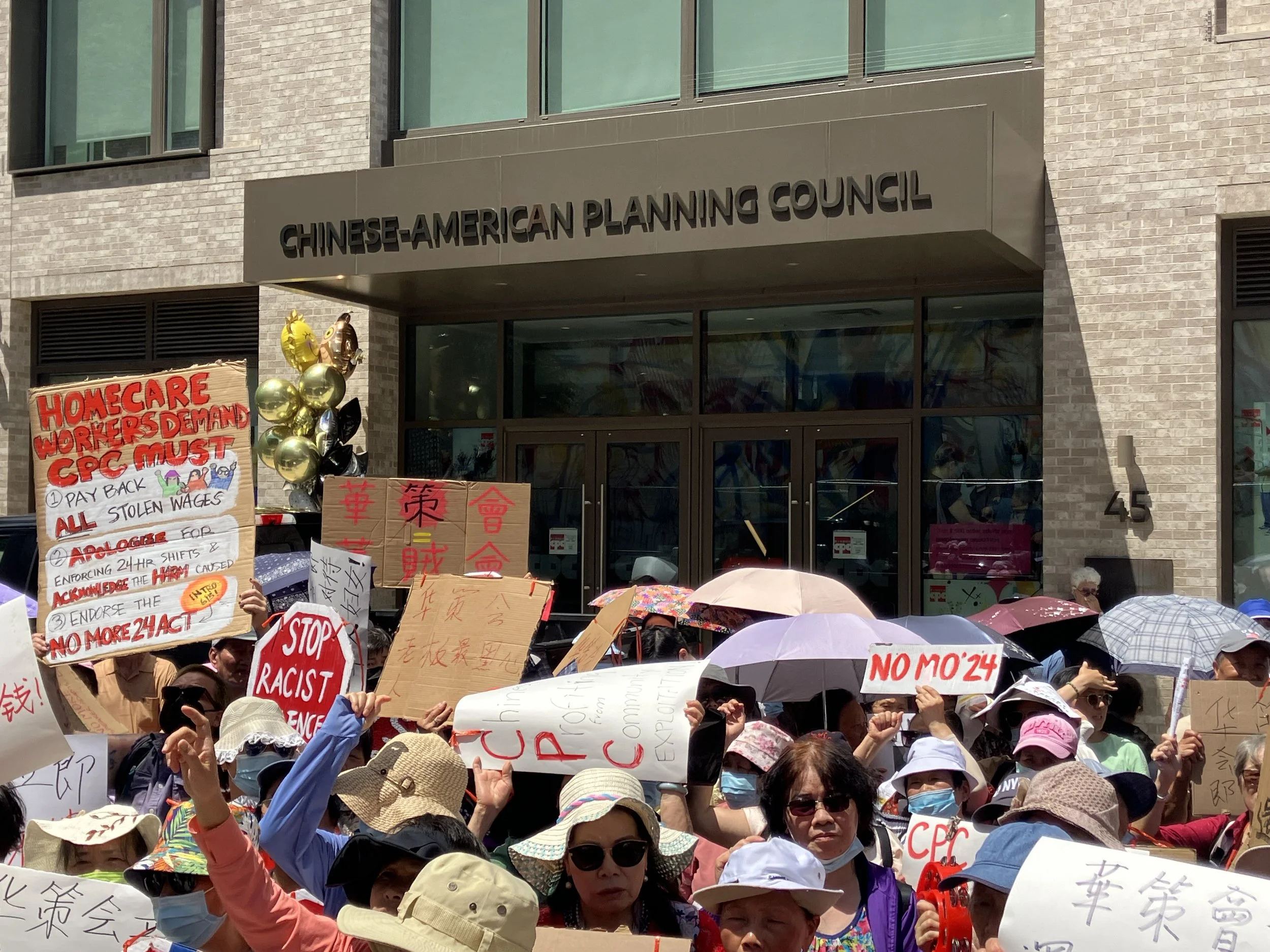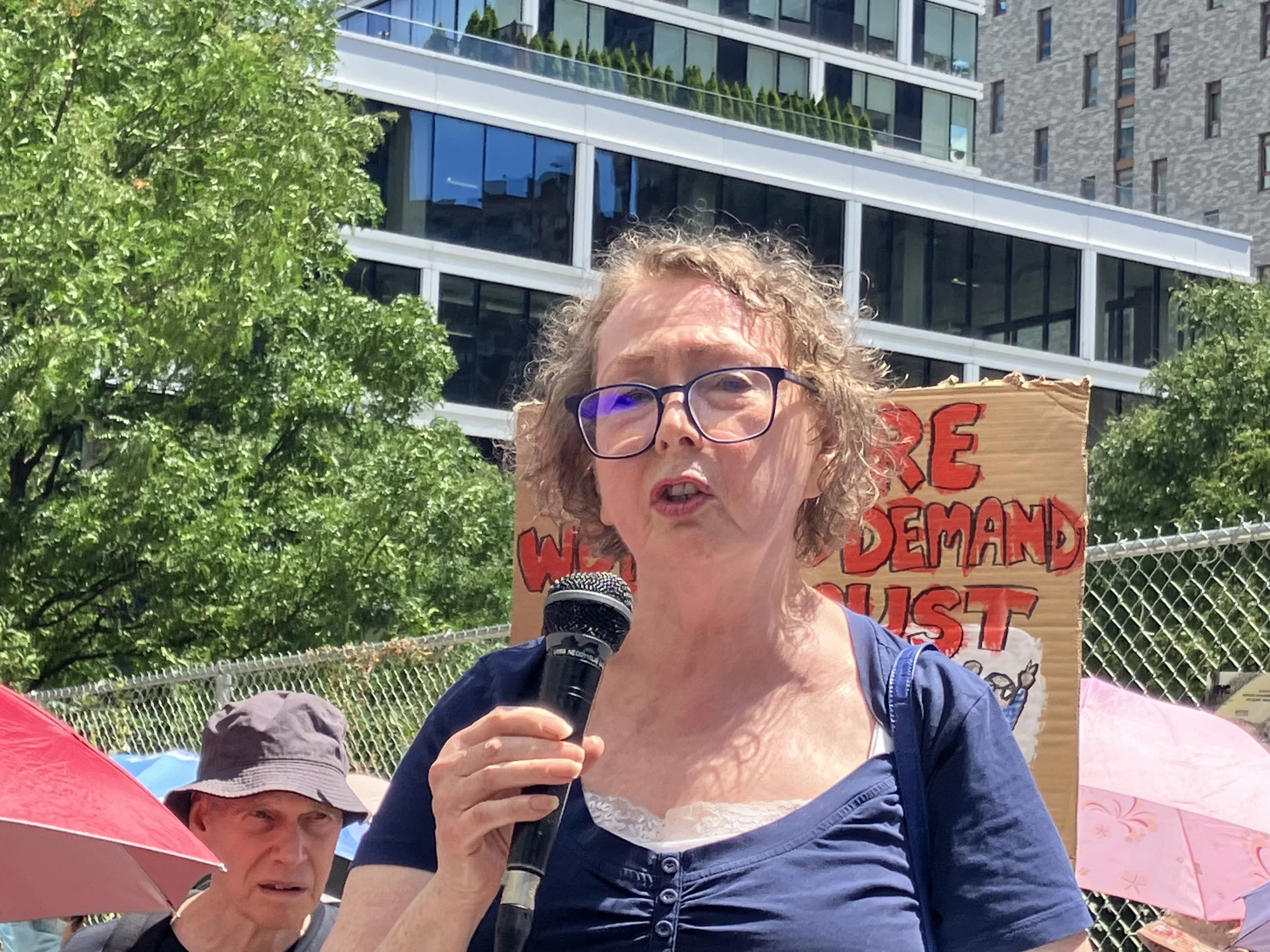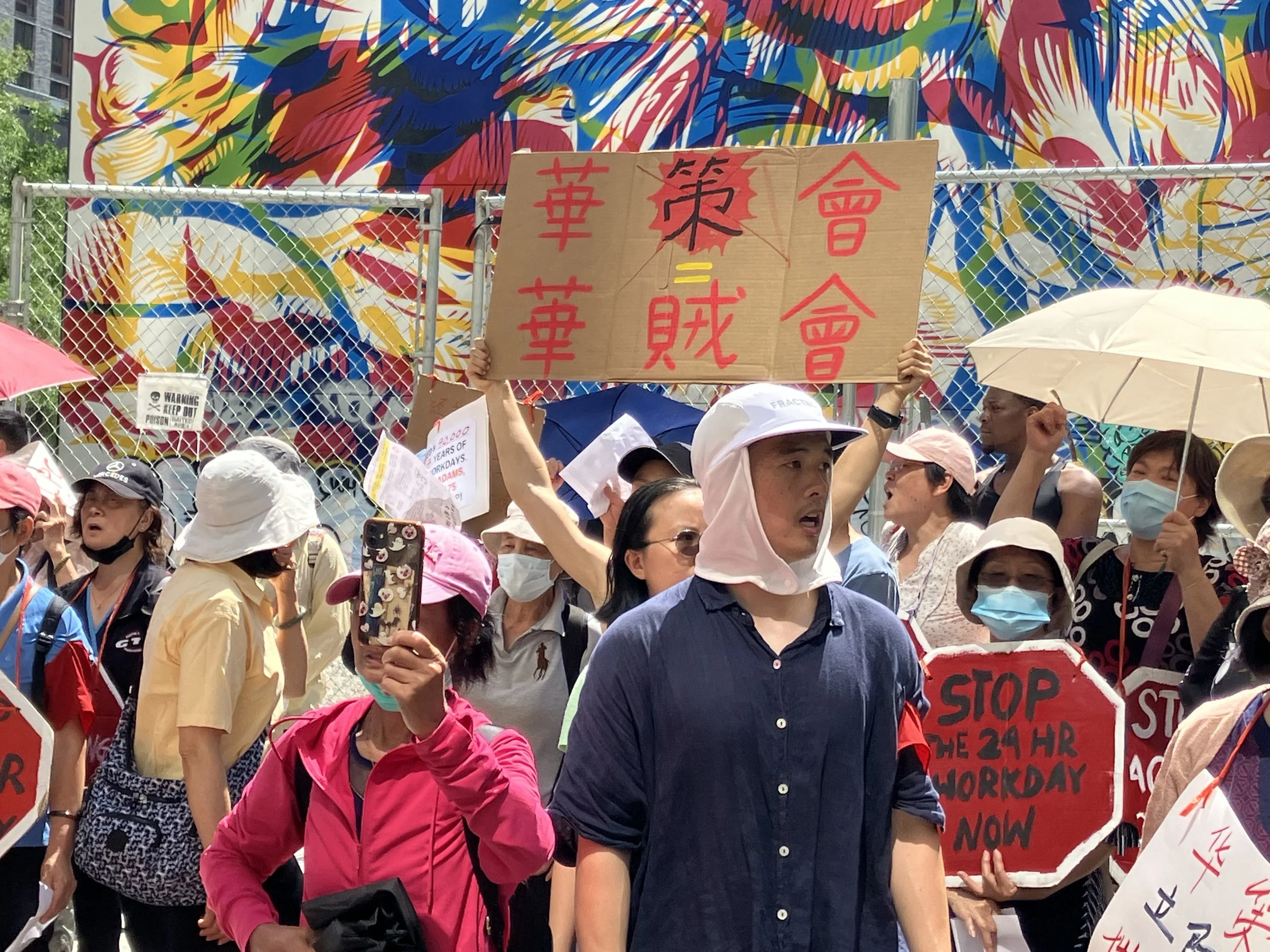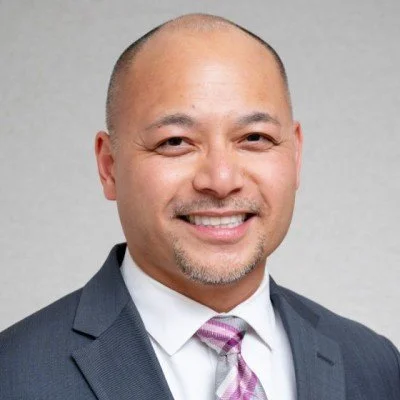Outside v. Inside: NYC Home Care Workers Denounce 24-Hour Shifts; CPC Head Concedes It’s Not Fair and Should Stop
Despite near-universal condemnation, home care workers in New York City continue to be subjected to mandatory round-the-clock shifts. Photos/Joe Maniscalco
By Joe Maniscalco
Forcing older immigrant women of color to work punishing 24-hour shifts as home care workers is not fair and should stop, the head of the agency responsible for assigning many of those same jobs told Work-Bites this past week.
The ongoing fight to finally end 24-hour work shifts in New York City’s home care industry boiled over on Thursday afternoon outside the offices of CPC One—the Chinese-American Planning Council’s newly-opened HQ at 45 Suffolk Street—as angry home care workers rallying in intense summer heat partially shut down traffic outside the Lower East Side facility.
Inside, CPC President & CEO Wayne Ho told Work-Bites his organization supports workers trying to end the 24-hour work day, “and we ourselves, have been advocating for years to make sure that 24-hour shifts are changed into 12-hour split shifts…we recognize that 24-hour shifts are not fair to the workers.”
That doesn’t jibe with home care workers and their supporters who advocate passage of a New York City Council bill seeking to ban round-the-clock shifts called the “No More 24 Act,” and who continue to hold a series of ongoing rallies and demonstrations outside the gates of City Hall, including a five-day hunger strike in March in support of the legislation championed by City Council Member Chris Marte [D-1st District].
Home care workers demanding an end to round-the-clock shifts pack Suffolk Street outside the Chinese-American Planning Council’s new HQ.
They charge the CPC—touted as the largest Asian American social services organization in the country—with being a bad actor and actually helping to perpetuate the round-the-clock shifts home care workers are still forced to work and many liken to “modern day slavery.” Under the rules, home care workers are not only subjected to 24-hour shifts—they only get paid for 13 of those hours worked.
"I mean, we support the intent of the ‘No More 24’ act—but we don't know if the legislation will make a difference,” Ho told Work-Bites. “We've heard people say that there’s state preemption—that even if this passes at the City Council level, that there’s state preemption and the state will overtake it.”
Advocates of City Council Member Marte’s “No More 24” bill don’t buy that rationale either, insisting instead, as Downtown Independent Democrats [DID] President Richard Corman did at a City Hall rally also in March, that backing the City Council bill would actually “drive the issue in the state” where another piece of legislation from Assembly Member Harvey Epstein [D-74th District] and State Senator Roxanne J. Persaud [D-19th District] also aims to ban round-the-clock home care shifts—but has been stalled since 2019. That measure also has its problems.
Ho insisted the CPC is focused on helping to achieve the statewide legislation—but has “no position” on City Council Member Marte’s “No More 24” bill, which is similarly languishing inside the New York City Council because Speaker Adrienne Adams [D-28th District] steadfastly opposes it.
Cross-Union Retirees Organizing Committee [CROC] members Sarah Shapiro [l] and Evie Jones-Rich [r] urge home care workers to continue fighting for the “No More 24” bill in the New York City Council.
The Ain’t I a Woman Campaign, the advocacy group working on behalf of home care workers protesting round-the-clock shifts, charges the CPC with lobbying hard against the New York City Council’s “No More 24” bill and colluding with the speaker against it.
Ho denies the charge.
“It's actually even more disingenuous than it sounds,” Sarah Ahn, an organizer with the Ain’t I a Woman Campaign told Work-Bites. “People might not know, but the bill on the state level actually allows for workers to voluntarily consent to doing the 24 hour shifts. What we have been saying for years, from what we know of the basic experience of workers—is that there's so much coercion that goes on in forcing these women into 24-hour shifts.”
According to Ahn, the type of intimidation vulnerable home care workers associated with the CPC experience includes, “really threatening retaliatory tactics to keep women doing the 24-hour shifts.”
“So, voluntary consent is garbage—it's meaningless,” Ahn added. “When [the CPC] says that they're gonna push the state bill—it actually reveals their true colors. They are very much invested in keeping the 24-hour workday going.”
Former New York City Council member and State Supreme Court Justice Kathryn Freed speaks out in support of home care workers rallying against 24-hour shifts.
Ho, insisted “none of this issue has ever come up in the regular meetings between home care workers and my management team.”
“We have tried different means of addressing the 24-Hour home care shifts,” he said. “We have 2,500 home care clients, and a small portion have 24-hour care. Thirty-nine have 24-hour shifts and 38 have two 12-hour split shifts. The authority lies with HRA and health insurance companies; we are not allowed to split cases on our own. If we tried to split cases on our own, that's actually considered Medicaid fraud because home care is funded by Medicaid. We need authority from either HRA or the managed care organizations to fill the funding gap.”
Protesters rallying outside the CPC’s new building on Thursday—who also came under constant threat from a young man bent on disrupting the demonstration and calling himself "NYC’s #1 Street Activist”—further charged the organization with stealing more than $90 million from home care workers.
The New York State Department of Labor dropped a multi-year investigation into home care worker wage theft in April 2023, citing an arbitration settlement struck the year prior in which 42 home-care agencies were compelled to contribute a total of $30 million to a special fund set up to reimburse an estimated 5,000 to 8,500 workers who did 24-hour shifts for unpaid wages and overtime.
Home care workers and their supporters withstood high temps and a blistering sun outside the Chinese-American Planning Council’s HQ on the Lower East Side.
“We paid millions of dollars into the fund,” Ho said. “And it was up to the workers themselves, working with their union to access the fund. Any back wages is through the settlement agreement.”
Ultimately, home care workers were compensated far less than what they were actually owed, and subsequently launched a class-action lawsuit demanding the Department of Labor reopen its wage theft probe.
“We have workers who are owed $300,000, $400,000,” said Ahn. “So, the figure is way more than $90 million—$90 million is only based on six years of what the workers can claim through our state laws.”
Retired CPC home attendant Ah Lin Lok said she spent more than a decade working 24-hour shifts but only got paid for 13 hours each shift.
“Not only did I get injured, but during this time, I was unable to be with my children when they grew up, could not participate in their activities, and they felt alienated from me,” she said in a statement. “Think about this new building: every brick, every window, is made with our blood and sweat.”
Chinese-American Planning Council President & CEO Wayne Ho.
Interestingly, Martin F. Scheinman—the arbitrator at the helm of the 2022 settlement leading to the creation of the $30 million reimbursement fund—is the same arbitrator who attempted to pave the way for New York City to push 250,000 municipal retirees into a profit-driven Medicare Advantage health insurance plan that has been repeatedly shown to be harmful to patients and a threat to authentic Medicare benefits.
Thursday’s rally, as other home care rallies have in the past, garnered support from some of the key figures involved in the successful fight to block Mayor Eric Adams from going ahead and imposing Medicare Advantage on retirees anyway.
“They have their excuses—and their excuses are labor laws,” 91-year-old retired educator and Cross-Union Retirees Organizing Committee [CROC] member Evie Jones-Rich told protesters. “Well, I’ve been fighting labor laws all my life. I don’t accept any law, any practice that tells me I have to work twenty-four hours and get paid for only thirteen. No! No more twenty-four!”
Former City Council Member and NYS Supreme Court Justice Kathryn Freed also stood with home care workers calling mandatory round-the-clock shifts “un-American” and “unfair.”
“It’s such a basic right, it seems ridiculous they can’t work it out,” Freed told Work-Bites. “I’m sure the fact that [home care workers] are mostly people of color [has a lot to do with it]. A lot of them are immigrants, they’re people who are viewed as powerless, and can be threatened, bullied and pushed around—and basically say, ‘If you want to get the job, you have to agree to the twenty-four hours but you’re only gonna get paid for thirteen.’ That seems to undercut any kind of basic worker rights that the U.S. has stood for. It’s really kind of unbelievable.”






